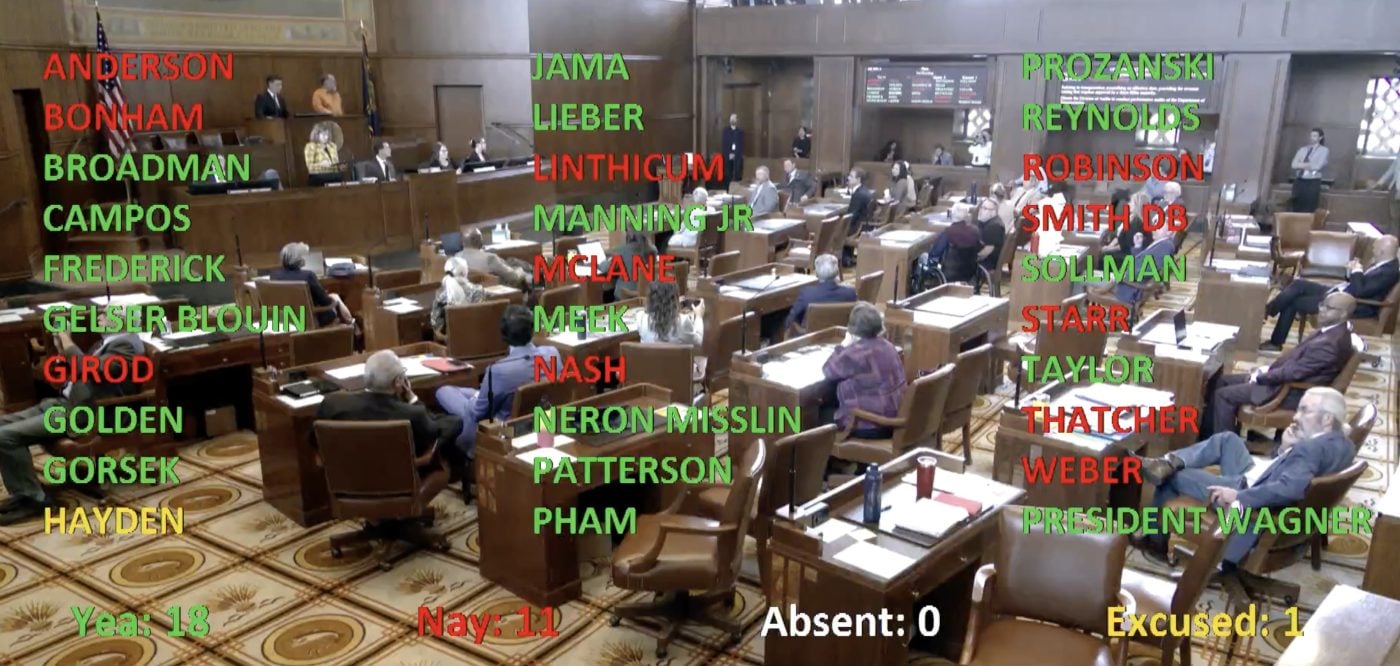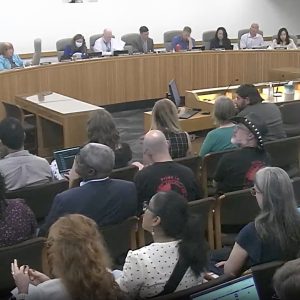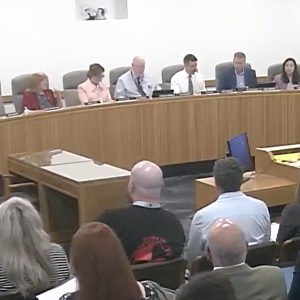It’s not the transportation bill any Oregon Democrats wanted, but it’s the only one they could manage to pass. Yesterday in the Senate Chamber the House Bill 3991 finally flopped over the finish line with a vote of 18-11. There were no surprises with votes and everything went pretty much as planned by Democratic leaders, a sentence I haven’t been able to write about this legislative process since it began back in May.
HB 3991 will raise about $4.3 billion over the next 10 years from a mix of increases on gas and payroll taxes along with higher fees for car ownership. The total revenue is just 35% of the what Democrats tried for when the bill was initially released (as HB 2025). At the outset of the session, Democratic party leaders hoped to use their control of all three branches of government to boost funding for basic maintenance and operations as well as bolstering buses and transit, making ODOT’s orphan highways safer, building safer routes to school, making electric bikes more affordable, paving off-street paths, and so on.
But there turned out to be a massive sinkhole between Democrats’ policy aspirations and political acumen. Party leaders seem to misread both Republicans and members of their own party. Senate President Rob Wagner and House Speaker Julie Fahey burned crucial time working with Republicans to make the bill bipartisan. They also assumed every Democrat would vote for it, even though some from more purple districts got cold feet when they saw the price tag.
Speaking at an event on Friday, Senator and Joint Committee on Transportation member Khanh Pham blamed the failure of the more robust initial bill on a variety of factors. “I think big picture,” Senator Pham shared in remarks at a park in downtown Troutdale, “[the failure had] to do with Republican opposition to transit, as well as some of my Democratic colleagues — who agreed that transportation was important, but maybe didn’t quite feeling the same urgency, particularly around safety and public transit.”
Despite what they’ve told their base, Republican lawmakers like newly named Senate Minority Leader Bruce Starr, were given a seat at the table in early negotiations. But because their ideas were not politically viable — among them were DOGE-like proposals to eliminate the Oregon Department of Transportation’s Climate Office, bicycle and pedestrian program, and to repeal the 1971 Bicycle Bill that ensures a minimum of highway investments include adjacent bicycling and walking facilities — almost none of them were included in the final legislation.
Instead of making their arguments stronger, or building coalitions and making compromises with fellow lawmakers, Republicans chose to do their politics on social media and in grandstanding floor and committee speeches. They ginned up opposition to the bill by using scare tactics and misinformation, which poisoned the well of public debate. Starr and other Republicans, including outgoing Senator Daniel Bonham (who’s barred from returning to the capital for taking part in a walkout in 2023), tried to make their points in desperate diatribes on the Senate Floor right up until the last minute.
So acute was Republicans’ disdain for Democrats and so focused were their tactics on getting a political win, that not one of them would even consider voting for the highly-compromised bill — even with the knowledge that two Democratic Senators had to come to the capitol building to ensure its passage despite major unresolved medical issues.
And despite HB 3991 being nothing more than a stop-gap measure to preserve ODOT jobs, prevent major upheaval in the delivery of basic transportation services statewide; and despite the fact that Democratic party leaders already caved to Republicans on several fronts just to get them to show up for the special session — Starr and Bonham clung to their tired, easily disproven narratives that the bill was an assault on all Oregonians and they gleefully promised to refer it to voters.
In her opening remarks about the bill in Senate Chambers yesterday, Senator Pham cleansed our timelines by sharing sober facts about the bill. While saying, “Nobody likes to raise taxes,” Pham explained that the typical Oregon family who drives 12,000 miles a year will pay an extra two dollars every month to ensure ODOT crews can fix potholes, paint fog lines, and keep roads plowed in winter. When it comes to the payroll tax that funds public transit, a family that makes $60,000 per year will pay an additional five dollars a month to maintain service for thousands of riders in cities and rural towns — many of whom have no other way to travel to things like medical appointments.
About Republican proposals to simply move money around and slash programs to fill the budget hole, Pham dismissed them as, “Nothing short of magical thinking.” “Any good faith review of ODOT’s actual budget would recognize that ODOT’s investments in DEI, safe routes to school and climate policy are orders of magnitude smaller than the massive budget holes we face to merely preserve our existing road systems,” she said.
And in the saltiest language I’ve heard from the very mild-mannered Pham about her legislative counterparts, she added, “Oregon’s policymakers need to be clear-eyed about the challenges ahead, not self-administering our own version of DOGE and weakening our ability to invest in the vital social services, education and infrastructure on which our communities depend.”
While Republicans gear up to gather signatures required to repeal the tax and fee increases, Democrats and supportive advocacy organizations are already talking about the next legislative session. Even if no major transportation policy proposals arise in the 2026 short session, we’re guaranteed the topic will be back on the table in 2027 when Democrats will have to fight to save transit funding from a Republican-built fiscal cliff. That’s because one of the compromises Republicans won by using the leverage of quorum was to sunset the payroll tax increase that pays for transit after two years.
Hopefully by then Democrats have learned the lessons of this past session.








Thanks for reading.
BikePortland has served this community with independent community journalism since 2005. We rely on subscriptions from readers like you to survive. Your financial support is vital in keeping this valuable resource alive and well.
Please subscribe today to strengthen and expand our work.
What a bummer of a bill, though at least it will prevent TriMet from succumbing to total disaster. It’s not totally clear to me whether or not the passage of this bill prevents the November cuts for which they’re currently gathering feedback. Regardless, I think it is long past time for the state to take funding public transit infrastructure seriously. If the state won’t do it, then the people need to gather signatures for a ballot measure that funds it through the state. I’d love to see a state-wide funding mechanism similar to what Portland has for PCEF that comes from big box stores and other mega-sized businesses.
Do you think a statewide ballot initiative for a partial sales tax to support transit would pass?
So far the data shows that PCEF has not raised prices for consumers and in fact there have been lawsuits to protect people from this (https://www.oregonlive.com/business/2024/01/winco-will-pay-36-million-to-settle-class-action-suit-stemming-from-hidden-clean-energy-surcharge.html).
A similar 1% tax on big box retail at the state level would be a boon to transit and distribute the money from the top rather than the bottom (or middle).
That lawsuit was about adding an additional “PCEF fee” to people’s totals at checkout. It was absolutely not about raising prices in response to PCEF, which retailers are free to do, and at least some have done (though I would love to see the data you claim shows otherwise).
So, do you think a statewide ballot initiative for a partial sales tax to support transit would pass? I’m not asking if you think it would be good policy, which you clearly do, but is it a viable idea?
Wal Mart and REI decided to close their only remaining Portland stores after PCEF was passed. Don’t act like this tax has no impact on consumer choice and our finances.
Any state-wide sales tax would be insanely unpopular, especially if the primary goal was to fund public transit.
Walmart leaving Portland was good, and you won’t convince me otherwise. If we are talking about “consumer choice” the role of quasi predatory big chains (Dollar Tree, Walmart, etc.) that depress prices initially to seek a local monopoly, then raise prices and provide a bunch of cheap crap should be broadly questioned.
REI left Portland because the workers were unionizing and the building was too small.
And in both cases, the companies in question cited retail theft as the proximate cause. I’m obviously skeptical of that, but I’m even more skeptical of your baseless assumption about PCEF.
This article, in the context of Portland, only mentions Target:
https://www.brennancenter.org/our-work/research-reports/myth-vs-reality-trends-retail-theft
Emphasis mine:
What does that tell us? It could be that stores Target closed were less profitable and therefore could not tolerate as much theft as more profitable ones that remained open.
I’m not planning on reading the report, so they may address this and similar concerns, but the excerpt you provided does not prove that stores did not close for reasons related to theft.
As always, reality is complex, and decisions like whether to open or close a store take into account many factors. It would be surprising if any single one could be isolated as “the cause”, though sometimes, something happens that isn’t decisive in itself, but causes you to rethink something you were taking for granted.
Single-factor attribution is hard, even in our own lives.
I wasn’t trying to attribute closing stores to a single factor.
Drew said:
And provided a summary of researchers’ conclusions that provided reason to be skeptical that theft was the only reason to close a store.
If the store simply had fewer customers and therefore could tolerate less shrink, then, like you say, there are multiple factors.
One could also imagine a poorly managed store that otherwise loyal customers simply didn’t prefer to other locations.
To blame it only on theft would be disingenuous in that case.
Calling this a “sales tax” would be a disingenuous tactic. And it would be only “insanely unpopular” if it focused on urban areas exclusively. Good transit is crucial for all of Oregon.
Just another tax on people you don’t like.
I can’t imagine who still thinks earmarks work. The reason “Transit” doesn’t have any money now is because the legislature spent the money elsewhere.
Democrats simply have to get more ruthless in their use of power. The GOP would if they could ever manage to get any in this state. The Democrats should scrap the quorum rules and just allow a simple majority to constitute a quorum. Until voters elect a majority of Republicans to either chamber, or as governor, Democrats should ignore them, ghost them. If Republicans want to see their policies enacted, it’s up to them to win a majority or win the gubernatorial election. Otherwise, they can just stay at home and daydream about joining Idaho.
“Democrats should scrap the quorum rules and just allow a simple majority to constitute a quorum.”
Or maybe they should continue to follow the state constitution.
Yes but what happens when big brother ignores the constitution and directs the army to focus on the enemy within? https://www.npr.org/2025/09/30/nx-s1-5557232/hegseth-generals-trump
Probably what happened in LA… Nothing.
But what does that have to do with quorum rules in the Oregon legislature?
To be clear, the quorum rules are in the Oregon Constitution – they’re not like the standards set at the beginning of the legislative session.
Article IV, Section 12
And of course, only the voters can change the Constitution.
JFC, the Democratic Party is so pathetically weak. It’s like a sad comedy of errors.
The fact that democratic leadership again and again made huge concessions despite repeated evidence that Republicans were only interested in american fascist accelerationism indicates that, in addition to being weak, democratic leadership is profoundly dumb*.
* the conspiratorial alternative is worse: that democratic leadership are still more afraid of empowering mild progressivism than enabling the government dysfunction that has led to american fascism
I think your latter theory might sadly be true – Democrats at the national and state level have been largely unresponsive to the fascist takeover because, at the end of the day, both parties are aligned when it comes to servicing the needs of capital above all else. They would rather have Trump than even a mild redistribution of wealth.
Mate, you’re chuckin’ around “fascism” like it’s a catch-all insult for anyone who doesn’t sip the same kool-aid. There’s a massive difference between a party that’s a bit dodgy, one that’s downright reckless, and actual fascism—and slapping that label on every Republican just makes the word about as useful as a chocolate teapot.
Sure, plenty of GOP players have acted like drongos, and yeah, Dems have copped a fair share of facepalm moments. But painting every GOP move as “fascist accelerationism” is lazy as, and it lets the Dems off the hook by turning the other side into cartoon villains rather than flawed blokes trying to play the game.
And your tinfoil hat theory that Dems are more scared of mild progressives than actual fascism? That’s rich as Vegemite on toast. The Dems aren’t trembling at progressives—they’re just hopeless at running the joint.
At the end of the day, this ain’t some high-stakes chess match. It’s more like a slow-motion trainwreck by a supermajority party that seems incapable of running a chook raffle, let alone the state of Oregon.
Liberal politicians have historically supported fascist regimes because they care more about profits for private property owners than they do about liberty for all.
Sometimes I read commentary from republicans or libertarians that government should really just do roads, military, and law enforcement, and stay out of everything else. This gives some evidence that they don’t even really care about roads!
What can we do to ensure that transit and multi-modal infrastructure is front and center for the short session?
This article did a good job of showing how pointless it was for Dems to try to appease Repubs. That will never work – not in Oregon or anywhere else. Republicans are not serious about governing.
How are the Dems any more serious about governing than the Republicans? I don’t see much brilliance from either side.
Angus. Come on.
Dems are actually trying to make government work and solve massive systemic problems. All most Republicans are doing is trying to burn it all down. Republican leaders have a DOGE Oregon podcast FFS and they support Donald Trump. That’s all we should need to say at this point.
> we’re guaranteed the topic will be back on the table in 2027 when Democrats will have to fight to save transit funding from a Republican-built fiscal cliff
Continue to think it is unfortunately not correct to describe this as a cliff — the cliff is already here and we are going off it right now because the 0.1% payroll tax increase was insufficient to avoid cuts in the first place
I am dubious this bill will “boost funding for basic maintenance and operations”. I would guess most of the $4.3b will go toward expanding highways like the Rose Quarter expansion and Columbia River Crossing aka Interstate Bridge Replacement.